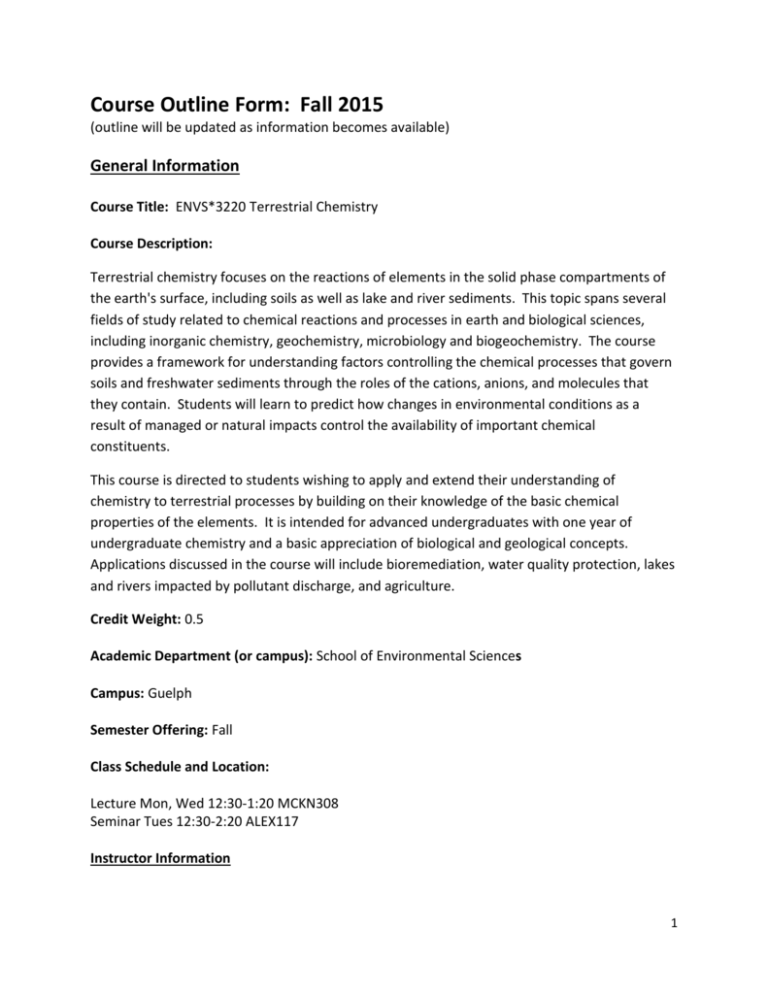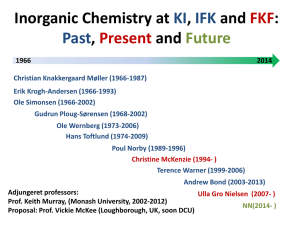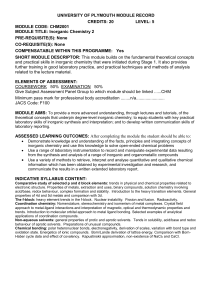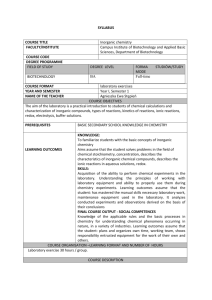Course Title: ENVS*3220 Terrestrial Chemistry
advertisement

Course Outline Form: Fall 2015 (outline will be updated as information becomes available) General Information Course Title: ENVS*3220 Terrestrial Chemistry Course Description: Terrestrial chemistry focuses on the reactions of elements in the solid phase compartments of the earth's surface, including soils as well as lake and river sediments. This topic spans several fields of study related to chemical reactions and processes in earth and biological sciences, including inorganic chemistry, geochemistry, microbiology and biogeochemistry. The course provides a framework for understanding factors controlling the chemical processes that govern soils and freshwater sediments through the roles of the cations, anions, and molecules that they contain. Students will learn to predict how changes in environmental conditions as a result of managed or natural impacts control the availability of important chemical constituents. This course is directed to students wishing to apply and extend their understanding of chemistry to terrestrial processes by building on their knowledge of the basic chemical properties of the elements. It is intended for advanced undergraduates with one year of undergraduate chemistry and a basic appreciation of biological and geological concepts. Applications discussed in the course will include bioremediation, water quality protection, lakes and rivers impacted by pollutant discharge, and agriculture. Credit Weight: 0.5 Academic Department (or campus): School of Environmental Sciences Campus: Guelph Semester Offering: Fall Class Schedule and Location: Lecture Mon, Wed 12:30-1:20 MCKN308 Seminar Tues 12:30-2:20 ALEX117 Instructor Information 1 Instructor Name: Susan Glasauer Instructor Email: glasauer@uoguelph.ca Office location and office hours: 321 Alex; office hours by appointment (phone 52453 or email) Teaching Assistant: TBA Course Content Learning Outcomes: 1. Understand how biotic and abiotic components of soils and sediments control element chemistry. 2. Select and apply appropriate analytical methods to characterize soil and sediment chemistry. 3. Critically evaluate information pertinent to soil and sediment chemistry presented in scientific, technical and popular formats. 4. Communicate ideas and information pertinent to soil and sediment chemistry in written and oral formats and demonstrate accurate use of scientific terminology and notation. 5. Improved facility at communicating technical information and ability to assess and defend alternate points of view. 6. Understand soil and sediment chemistry in the broader contexts of inorganic chemistry and biogeochemistry. 7. Apply information gained on soil and sediment chemical processes to develop treatment approaches for contaminated soil and sediment. Lecture and Seminar Content: 1. Introduction (Weeks 1-2) Brief review: Categories of soils/sediments, basic properties (particle size distribution, texture, etc.); geology (igneous, metamorphic, sedimentary rocks); weathering. Distribution of elements in terrestrial systems; element mobility, ionic potential Processes controlling fates of elements (solid, aqueous, gas, biota) Practical chemistry: assessing soil/sediment chemistry Acid-base chemistry, steady state vs. equilibrium, redox, chemical equilibria; pH and redox as master variables. Kinetics and time as factors in soil processes Capacity, intensity and exposure Seminar Week 1: Working with units, dimensional analysis Week 2: Assessing pH and reduction potential; field trip 2 2. Mineral and organic components of soil and sediments (Weeks 3-6) (W5 Thanksgiving) Inorganic components and the major structural elements, solids (radius ratios, bond-valence, etc.) Clay minerals Metal oxides Organic matter, C, N, and structural elements Surface reactions: comparison of permanent charge to variable charge minerals, reaction with water, cation exchange and selective coefficients, chemisorptions, sorption vs. precipitation. Seminar Week 3: Mineral structure; XRD; ASSIGNMENT 1 DUE Weeks 4 and 6: Adsorption capacity of clay minerals, organic matter or iron oxide: ASSIGNMENT 2 DUE WEEK 6 3. Carbonate chemistry in sediment and water (Week 7) Equilibria with carbon dioxide Solubility of carbonate minerals Weathering reactions Organic matter decomposition and biota Seminar Week 7: MIDTERM (does not include carbonates) 4. Alkali Metal and Alkaline Earth Elements (Week 8-9) Distribution in soil and inorganic and organic soil components Biological role Chemical properties -Ionic potential, hydrolysis, hydrated radii, solution complexation reactions -Acid-base chemistry, solubility product Influence on physical properties of soil and colloidal materials, saline/sodic soils Seminar Week 8: Calculating ionic strength and activity; conductivity measurements Week 9: TBA 5. Major structural elements (aluminum, iron, and silicon) (Week 9-10) Distribution in soil and inorganic and organic soil components 3 Monomeric and polymeric forms, phase diagrams Biological role: toxicity, nutrients to plants and animals Iron and redox Seminar Week 10: Phase diagrams 6. Transition elements (d-orbital + Zn) (Week 10-11) Distribution in soil and inorganic and organic soil compounds, toxicity Acid-base characteristic, redox (role of microbes in controlling), complexes and chelates, interactions with minerals, phase diagrams Pedogensis and element distributions Forms and distributions in soils/sediments; contamination and remediation Seminar Week 11: ASSIGNMENT 3; Manipulating redox chemistry to remediate metals in water and sediment 7. Oxyanions (P, As, S, Se, B, Si) (Weeks 11-12) Distribution in inorganic and organic soil/sediment components Biological role Biological transformations Chemical properties: ionic radii and substitution, electronegativity, redox Seminar Week 12: POSTERS AND PRESENTATIONS Course Assignments and Tests: Assignment or Test Due Date Assign 1 Assign 2 Assign 3 Midterm Poster/Presentation Final 9/29 10/20 11/24 10/27 12/1 12/18 Contribution to Final Mark (%) 5 5 5 25 25 35 Learning Outcomes Assessed 3, 4, 5 2, 3, 4, 5 2, 3, 4, 5 1; 3-7 1; 3-6 1; 3-7 Additional Notes: 4 Journals Active reading is essential to your success in the course. Students are expected to keep a journal consisting of notes taken on the reading assignments. These notes should not repeat the reading verbatim, and they are not meant to reproduce every concept or thought presented by the authors. The notes should 1) demonstrate a grasp of the main points; 2) push you to tackle challenging concepts; 3) prepare you for class discussions, and 4) serve as useful reference material. Midterms and finals These will consist of multiple choice, short answer and essay questions. The midterm will cover the material (lecture and seminar) up to the lecture before the midterm. The final is comprehensive. Assignments Detailed instructions for the assignments and the poster/presentation project will be given in class. Final examination date and time: Friday, Dec. 18, 2015 08:30-10:30am; room TBA Final exam weighting: 35% Course Resources Required Texts: Reading assignments will be posted on D2L by the week before the reading is due. Other Resources: Additional material for the course will be posted on D2L as required. Field Trips: The field trip will take place on September 21 or as arranged. There will be no cost and transportation will be provided. Laboratory work Students will require a laboratory coat, eye protection and closed toe/closed heel shoes. Please see me if you don't have a lab coat or safety glasses. Course Policies Grading Policies:The midterm is given during a regular class meeting time (seminar, as described). 5 Policy on Late Assignments: Making up a missed exam or assignment requires a doctor's note or equivalent. Late assignments will be penalized at a rate of 20% markdown per day after the due date. Copies of out-of-class assignments: Keep paper and/or other reliable electronic back-up copies of all out-of-class assignments: you may be asked to resubmit work at any time. Course Policy on Group Work: Group work will be allowed only where explicitly assigned by the instructor. Course Policy regarding use of electronic devices and recording of lectures: Presentations which are made in relation to course work—including lectures—cannot be recorded or copied without the written permission of the presenter, whether the instructor, a classmate or guest lecturer. Material recorded with permission is restricted to use for that course unless further permission is granted. Phones and laptops are distractions not just for the people using them, but for others sharing the same space. A recent study showed that students attempting to multi-task using laptops in the classroom did much worse than peers using pencil and paper to take notes. Even worse, students sitting next to the multi-taskers also suffered significantly ("Students' use of laptops in class lowers grades: Canadian study". Globe and Mail, August 14, 2013). The use of cell phones, including texting and checking messages, is prohibited during class time. Please leave the room if you need to use your phone. Laptops are essential for some students to take notes, but they can create a distracting space within the classroom. You may use your computer for notetaking; you may not use it for any other purpose during class time as there will be no need to access the internet. University Policies Academic Consideration: The University of Guelph is committed to supporting students in their learning experiences and responding to their individual needs and is aware that a variety of situations or events beyond the student's control may affect academic performance. Support is provided to accommodate academic needs in the face of personal difficulties or unforeseen events in the form of Academic Consideration. 6 Information on regulations and procedures for Academic Consideration, Appeals and Petitions, including categories, grounds, timelines and appeals can be found in Section VIII (Undergraduate Degree Regulations and Procedures) of the Undergraduate Calendar. Academic Misconduct: The University of Guelph is committed to upholding the highest standards of academic integrity and it is the responsibility of all members of the University community, faculty, staff, and students to be aware of what constitutes academic misconduct and to do as much as possible to prevent academic offences from occurring. University of Guelph students have the responsibility of abiding by the University's policy on academic misconduct regardless of their location of study; faculty, staff and students have the responsibility of supporting an environment that discourages misconduct. Students need to remain aware that instructors have access to and the right to use electronic and other means of detection. Please note: Whether or not a student intended to commit academic misconduct is not relevant for a finding of guilt. Hurried or careless submission of assignments does not excuse students from responsibility for verifying the academic integrity of their work before submitting it. Students who are in any doubt as to whether an action on their part could be construed as an academic offence should consult with a faculty member or faculty advisor. Detailed information regarding the Academic Misconduct policy is available in Section VIII (Undergraduate Degree Regulations and Procedures) of the Undergraduate Calendar. Accessibility: The University of Guelph is committed to creating a barrier-free environment. Providing services for students is a shared responsibility among students, faculty and administrators. This relationship is based on respect of individual rights, the dignity of the individual and the University community's shared commitment to an open and supportive learning environment. Students requiring service or accommodation, whether due to an identified, ongoing disability or a short-term disability should contact the Student Accessibility Services (SAS), formerly Centre for Students with Disabilities (CSD), as soon as possible. For more information, contact SAS at 519-824-4120 ext. 56208 or email sas@uoguelph.ca or visit the Student Accessibility Services website (http://www.uoguelph.ca/csd/). Course Evaluation Information: End of semester course and instructor evaluations provide students the opportunity to have their comments and opinions used as an important component in the Faculty Tenure and Promotion process, and as valuable feedback to help instructors enhance the quality of their teaching effectiveness and course delivery. 7 While many course evaluations are conducted in class others are now conducted online. Please refer to the Course and Instructor Evaluation Website for more information. Drop period: The drop period for single semester courses starts at the beginning of the add period and extends to the Fortieth (40th) class day of the current semester (the last date to drop a single semester courses without academic penalty) which is listed in Section III (Schedule of Dates) of the Undergraduate Calendar. The drop period for two semester courses starts at the beginning of the add period in the first semester and extends to the last day of the add period in the second semester. Information about Dropping Courses can be found in Section VIII (Undergraduate Degree Regulations and Procedures) of the Undergraduate Calendar. Additional Course Information Commitment to the course: This course is worth 0.5 credits. According to University policy, you should plan on spending up to 12 hours per week engaged with this course, including lectures and seminars. That leaves around 8 hours for study outside of class meetings. If you have invested this amount of time and still feel like you're struggling to keep up, please make an appointment to see me. 8





